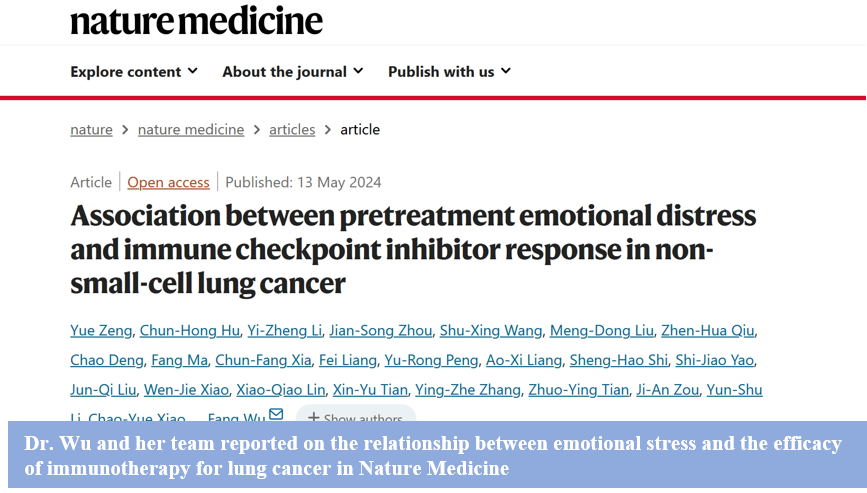On May 13th, 2024, Dr. Wu’s team published an article on Nature Medicine titled “Association between pretreatment emotional distress and immune checkpoint inhibitor response in non-small-cell lung cancer”. This original study suggests that there is an association between emotional distress and immunotherapy resistance in non-small-cell lung cancer, and proposes a new model to predict the efficacy of cancer immunotherapy combining psycho-biomarkers .
Dr. Wu is the independent corresponding author of the article, Professor Hu Chunhong, Ph.D.students Zeng Yue and Li Yizheng from the Oncology Center of the Xiangya Second Hospital are co-first authors. Professors Liu Xianling, Wang Xiaoping, Zhou Jiansong, Associate Chief Physician Ma Fang, Associate Researcher Zhang Xiaojie, Attending Physicians Qiu Zhenhua, Deng Chao, and Associate Chief Nurse Xia Chunfang from the thoracic oncology MDT team at the Xiangya Second Hospital, along with statistician Liang Fei from Zhongshan Hospital affiliated with Fudan University, and other multidisciplinary experts participated together in the study.
Abstract
Emotional distress (ED), commonly characterized by symptoms of depression and/or anxiety, is prevalent in patients with cancer. Preclinical studies suggest that ED can impair antitumor immune responses, but few clinical studies have explored its relationship with response to immune checkpoint inhibitors (ICIs). Here we report results from cohort 1 of the prospective observational STRESS-LUNG study, which investigated the association between ED and clinical efficacy of first-line treatment of ICIs in patients with advanced non-small-cell lung cancer. ED was assessed by Patient Health Questionnaire-9 and Generalized Anxiety Disorder 7-item scale. The study included 227 patients with 111 (48.9%) exhibiting ED who presented depression (Patient Health Questionnaire-9 score ≥5) and/or anxiety (Generalized Anxiety Disorder 7-item score ≥5) symptoms at baseline. On the primary endpoint analysis, patients with baseline ED exhibited a significantly shorter median progression-free survival compared with those without ED (7.9 months versus 15.5 months, hazard ratio 1.73, 95% confidence interval 1.23 to 2.43, P = 0.002). On the secondary endpoint analysis, ED was associated with lower objective response rate (46.8% versus 62.1%, odds ratio 0.54, P = 0.022), reduced 2-year overall survival rate of 46.5% versus 64.9% (hazard ratio for death 1.82, 95% confidence interval 1.12 to 2.97, P = 0.016) and detriments in quality of life. The exploratory analysis indicated that the ED group showed elevated blood cortisol levels, which was associated with adverse survival outcomes. This study suggests that there is an association between ED and worse clinical outcomes in patients with advanced non-small-cell lung cancer treated with ICIs, highlighting the potential significance of addressing ED in cancer management. ClinicalTrials.gov registration: NCT05477979 .
